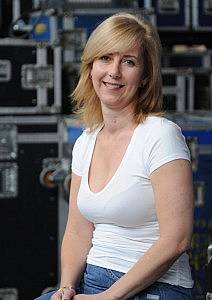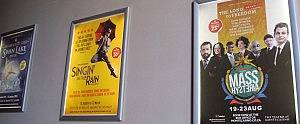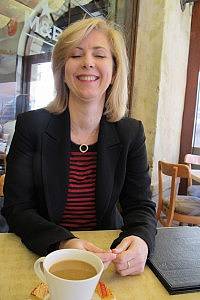One tends to get a warm, fuzzy feeling when meeting up with Helen Surgeson. It’s a rare quality because even if you do not know her that well, it’s like having a sister in the industry, one whom you respect. Helen has worked on spectacular musicals, successfully tried her hand in the corporate realm, and more recently works as Operations Manager and sometimes Production Manager on international shows playing in South Africa. A compliment she will never forget was from a colleague who introduced her to someone saying, “This is Helen and she’s one of the guys.”
As a little girl living in Durban, Helen loved to dance and sing, undoubtedly encouraged by her gran who was a music teacher and her mother who played various musical instruments. Helen found herself drawn to the arts and became interested in films. On a day, her mom came up with a suggestion, “Helen, there is a Theatre Technology Course at the Natal Technical College. I think you’ll like it.”
While make-up, hair and costume formed part of the Theatre Technology Course Helen attended in the mid 1980s, the technical aspects of shows captivated her. As a result she completed her internship at the Durban Playhouse theatre, with her final 6 months specialising in audio and Stage Management. It was a feather in her cap when the Playhouse asked Helen to be the ASM on a production in 1988. “It all fell into place and it felt like home,” she recalls.
The Playhouse years
Those were the glory days when theatre in South Africa was booming and the Playhouse had five venues and nearly 1 000 employees made up by the orchestra, ballet theatre, drama company, workshop, technical and admin. Your background and appearance were irrelevant in that environment”, said Helen. “As long as you were passionate, and good at what you did, you were accepted. Theatre allowed us the freedom to be individuals, something, which has always been important to me.”
Magical productions ran at the Playhouse from 1988 to the start of 1995. “There are so many memories,” Helen muses. NAPAC had been based at the Alhambra Theatre and at the end of 1986 they moved to the Playhouse. The period from 1986 to about 1992 were seen as the Golden Era. We were fortunate that there was a lot of government subsidy. There were so many good people and there was an incredible artistic team. The late Geoffrey Sutherland headed the musical theatre department and I worked mainly in musical theatre.
“We did countless shows from Hello, Dolly! to Camelot and The Trilogy which is something that people in the theatre still talk about and which I think will never be repeated in South Africa. Geoffrey had a vision to take three different productions, Sweet Charity, Sweeney Todd and Candide. They brought together one cast and we rehearsed the plays in tandem. It was one stage set which then changed between the productions. So the planning behind that, the scheduling of that was extreme! Andrew Botha wasn’t designing a set for one show, he was doing it was for three very different shows. The lighting, by Stan Knight and the in-house team, had to accommodate three very different shows. There were three different directors, Geoffrey Sutherland did Sweeney Todd, Terence Shank did Sweet Charity, which was the production I worked on, and then Janice Honeyman did Candide. So we opened a show, rehearsed the next one on stage, then opened that one, then rehearsed the next one and then opened that. We were changing between three shows. And then, on the final day, a Sunday, we did Candide in the morning, Charity in the afternoon and Sweeny Todd in the evening. I only did one production but the cast had to do all three.”
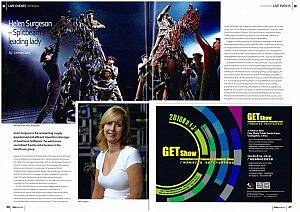
Helen featured in the most recent edition of Pro-System (Oct 2015). There could not have been a better headline. The second part of the article is further down. Click to enlarge.
The assembled cast consisted of established performers such as David Dennis, Kate Normington, Mark Richards and Jenny De Lenta. “People came from all over South Africa for that final day. That was extraordinary and I was starting my career doing extraordinary theatre. Shows had standing ovations every night. Later I learnt that was not always the case in theatre.”
Helen’s early days as an Assistant Stage Manager saw her working predominantly on musicals and she was responsible for the rehearsals, the rehearsal room with the stage manager, and taking care of props. “Having a dance background, I loved that!” she says. “We would operate the good old reel to reel tape recorders and keep track in counter numbers. When they were choreographing the dancers I would keep accurate numbers, and I developed knowledge of what Geoffrey and the other choreographers were working on. I could keep accurate numbers and they would go ‘can we go back a little bit?’ and I’d say, ‘What about to this dance step?’ Because I understood where they were coming from, I found a place, it was a strong point for me and I really enjoyed being part of that creative process.”
As musical theatre shows were usually larger productions, it took a few years until she ran shows herself as Stage Manager. “But I didn’t mind that,” said Helen. “I loved what I was doing and there were so many productions. By the time I left the Playhouse I had done just over 30 musicals ranging from Seven Brides to Seven Brothers, Camelot, and Queen at the Opera, to small musical reviews in the Supper Theatre. “
In 1993 the financial strains started to show in theatres countrywide and the Playhouse underwent a large retrenchment process. The main Napac, Pact, PACofs and CAPAB received assistance from the government in pre-apartheid South Africa. “With the democratic change in our country they could no longer afford to subsidise,” Helen explains. “I supposed theatre was seen as something for the privileged few. But the arts feeds the soul and it’s very necessary. We needed to swing one way and I’ve always believed it would swing back, and we’re starting to see it. It has taken casinos to open theatres. That’s where the money comes from these days. The casino industry reintroduced theatre where the performing art councils are battling to stay alive.”
At the time it was sad for Helen to see the Brain Drain. “In theatre everyone works strange hours and soon your colleagues become your friends and you tend to spend more time with them then anyone else. There were a lot of very experienced people who left, some taking the voluntary retrenchment packages. The company was never the same and it tore us apart. It was a very difficult time.”
Helen worked alongside her colleague and friend, Robyn D’Alessandro, who funnily enough is her friend and colleague at Gearhouse. “We seem to follow each other,” smiles Helen. Robyn had moved from the Playhouse to join the Johannesburg Civic Theatre (now known as The Joburg Theatre), where she was the Senior Stage Manager. “Robyn’s family were in Durban and she came down on holiday to see them during the Christmas period. She said they were looking for a Stage Manager at the Civic. I never even thought about it for myself but in a family conversation I mentioned it to my mom,” said Helen. “My mom answered, lf you stay at the Playhouse, where will you be in a year’s time? Why not give it a try?’
It struck Helen that no matter how much she loved the Playhouse, it was not, at that time, going from strength to strength. The Johannesburg Civic was the newest and best-equipped theatre in the country, it had a new business model, it was not a production house, it was a receiving house and Helen decided to take a chance.
At the Civic
“Thankfully many of my friends had moved up to Johannesburg already and I don’t think I could have done it if that had not been the case. A lot of people I had studied with I now worked with. You know, I walked into the theatre and had friends in all the departments. When you’ve lived in one city for 28 years, to suddenly make that change can be difficult. You actually don’t realize how comfortable you had been having that safety net there the whole time. But it was exciting and I think I got to do amazing things at the Civic.”
The new environment was totally different. “At the Playhouse you had a Production Manager, a Technical Stage Manager, a Stage Manager, an ASM,” she explains. “Now suddenly it was just Stage Management so I was having to apply and do the things which I had only watched other people do, and it was good. It also taught me how much I had actually learnt up until that time.”
The Civic hosted many international performances and Helen’s first production was the Royal Shakespeare Company with Les Liaisons Dangereuses. “There were also the Touring Dance Companies and I found it fascinating working with the internationals and realizing how much we have in common throughout the world.”
Life was different but Helen delighted in learning. Days revolved around the theatre, rehearsals from 9am to 6pm and in production week from 9am to whenever. Show mode saw Helen and the crew come in two hours prior to the show as they switched to night owls. With the excitement and buzz at the end of a performance it would be impossible to go to bed straight away. “So we’d finish work at 11 o’clock and end up going for drinks or I’d sit at home and watch TV, something to unwind, and then end up sleeping all morning! But as long as I was being challenged I was happy. I am a passionate person and the people were lovely.”
The Corporate Shift
Helen’s eyes opened to the corporate world in 1998. “I had taken unpaid leave to do a corporate event, but it wasn’t just an ordinary one,” she recalls. “It was for Vodacom, produced by Hazel Feldman. We rehearsed for two weeks and then performed at the Vodadome in Midrand.” The Vegas Style show included dance and speciality acts with supper. It was the official year-end function for everyone who was associated with Vodacom and ended up being a lot of fun.
“It was ten nights of 500 people per night and there was budget!” she remembers. “I was introduced to people who worked freelance; I hadn’t actually met a lot of freelancers till then. I think something that sometimes happens to people who work permanently for a company is loosing some of your passion; you can be less dedicated because it’s a job and it’s secure. When you freelance, on the other hand, you are only as good as your last job. I met some really wonderful people and Alistair Kilbee (today of Gearhouse Splitbeam) was one of them, working as a flyman. I realised there was something different out there. The Civic was winding down a bit, the money wasn’t always there, people were resigning and they weren’t replacing staff.”
After seeing the corporate world, Helen took a break at the end of 1999.
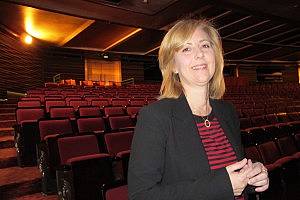
Helen had been given the opportunity to work on the Vodacom corporate through Mark Ransom. Mark had also given Helen her first job at the Playhouse. “So he knew me although it had been ten years since we had worked together. He also asked Helen to work on the Three Tenors as Production Assistant once again with Hazel Feldman once she had left the Civic.
“There are a lot of other people, and a lot of woman who are phenomenal and have done very well in the industry,” said Helen. “I have been blessed by having some amazing mentors who have had faith in me. I also try to give back and when I see potential, I like to nurture it and give opportunities. There’s nothing more rewarding than seeing somebody who rises through ranks – Alistair Kilbee is proof of that. He tried his hand at everything where he was needed and only then moved into lighting and now Technical Production Management. In my career, I had that diploma but it meant nothing. I had to work; I had to show willingness.”
Clement Makama at Gearhouse comes to mind. “I met him as a freelancer doing his internship at the Civic where I was a freelance stage manager. People know if someone is going to be a good technician. You see it; it’s an innate thing and something that can’t be taught. As a practitioner one recognises it in others and I saw potential in Clement. Later when I was at Caesars I was able to give him a job as a follow spotter/ lighting technician. He took the opportunity with both hands, and now, 15 years later, is Head of Lighting at Splitbeam.
At the end of 1999 Helen left the Civic and took a six month break to travel abroad. “I I returned and tried to get back into industry but it took a while. Once again it was Mark Ransom. He had said to me, “We’re opening Caesars, they are going to be putting on a show in like we did for Vodacom and I’d like you to be part of it. Helen had to get herself through eight months before that work would commence.
During this time, Helen did Freelance Stage Management in Johannesburg, Pretoria and Cape Town. “I had the misfortune of being the Stage Manager for the State Theatre Ballet Company when it closed for their final season, which was the Merry Widow. (Here comes my history with Brian Hill. I’ve known him my entire career .”) (this should be connected to the Teatro)
Before the eight months of waiting were up, Mark Ransom pulled Helen into Caesars. He was involved with the development side of the then new theatre and needed somebody on site every day to oversee the on-going projects. “That was probably the first time I experienced chauvinism in the workplace, as here I was, this young woman on a building site,” said Helen. “And after a while Mark arrived and said, ‘It’s quite amusing, I’ve got people, like the building contractors and so forth saying, gee, Helen knows what she’s talking about!’
The experience was fascinating and all Helen had learnt over the years came flooding back. “Here was this empty theatre that needed to be kitted out and I actually knew a lot about it. I felt like I had been a sponge up to then and put into this environment was bringing out the knowledge.” Prosound was the main contractor and that is where Helen met Keith Pugin, now with DWR Distribution and Mark Malherbe. “I had known Mark’s name and while we had never met, came from the same background.” “Other companies involved included Ees Millinery who did all the draping.
“I was at the Emperor’s (formerly Caesars) recently for the opening of Beautiful, said Helen. “It has changed a lot but I looked at the drapes and thought, I was there when they went up, I was there when the carpet went down. There was certain equipment bought ten years ago from Electrosonic through Duncan Riley like the hazer, and it’s still there. Definitely I know I left my stamp on that theatre.”
Caesars asked Helen to stay on as the Theatre Technical Manager and after a chat with Mark Ransom, who had an idea that he pitched to Gearhouse, things fell into place. He was starting a division that was then known as Gearhouse Venue Technical Management (GVTM). And he said, ‘Hang on, what if we do this as GVTM? And then you work for Gearhouse but are based at Caesars?’ There was nothing to think about. I knew I would have the support and that Gearhouse was a fantastic company.
Mark Ransom would be Helen’s boss and once he pitched the idea to Caesars they went with the concept. “So basically I was outsourced theatre management. But I was the only person. That’s where I started with Gearhouse 15 years ago!” she says.
Gearhouse
After five years at Caesars, Helen was moved to the Sandton Convention Centre where Gearhouse were the official technical suppliers of the venue. “That’s where I became very corporate,” she remembers. “I even had to dress the part. It was strange, no more jeans or t-shirts!
In mid 2005, when the contract at SCC ended, Helen and four other employees pitched an idea to Ofer Lapid and Nasser Abbas, joint managing directors of Gearhouse, about implementing a concept Nasser had always spoken about, A man with a Van. The idea was to have a van equipped with kit and a technician to supply small corporate events such as providing a projector for a boardroom presentation.
A man with a van
“Ofer and Nasser loved the idea straight away,” said Helen. “That was it. We had the equipment, we had the van and we had the personnel.”
Gearhouse were perceived to be the company who did the big shows and the new company would take care of the small to medium sized events. “So we put together a presentation to Management. It was a good idea as Gearhouse had clients who used other suppliers for smaller jobs and now didn’t need to. “Fortunately we already had the support of Ofer and Nasser, but I think we made people realize we knew what we were talking about, we understood the market, and we weren’t going to be competing with them for the traditional Gearhouse SA market,” explained Helen. “A lot of our work came from referrals from Gearhouse. We called the company Conference Gear. Which kind of said what we were but we had that “Gear” to link us to Gearhouse I think we broke even within the first year. Nasser never thought it would happen.”
Conference Gear was eventually absorbed into Gearhouse Venue Technical Management, which in turn became INHOUSE Venue Technical Management (IVTM) when Gearhouse bought out a company in Cape Town. Helen found herself involved in managing the venues in Johannesburg for a while plus doing what IVTM now calls C&E (Conference and Events).
Once the company became IVTM and things were changing and shifting, Helen knew the corporate field just wasn’t who she was. “I was capable of doing it but it wasn’t where my passion was. I had to sit down with Ofer and Nasser again, and recognising my ability to deal with people and managing client’s expectations, they moved me into sales. It was nice. I wasn’t there to do cold call sales or to find new business, but rather teamed up with, and managed, clients who were more technical. I worked quite closely with John McDermott over that time.
“It was during that time that it was tough for me. It was a big change and I don’t think it was the perfect match for me. But I learnt a lot.”
Helen had taken a few days off work when Peter Day called her. “The late Nasim Bismilla had been working with Alistair at Gearhouse Splitbeam and had been sick for a number of months,” said Helen. “Alistair was going to be travelling and he needed help. I was one of the few people he had said would be suitable to help. Peter Day called and said they felt I was the best candidate and in the best position work wise to be moved there. For six months I basically was doing my sales and helping Alistair.
That was three years ago. When Nasim sadly passed away, Helen stayed on and officially joined Splitbeam.
“I finally had come back to somebody I had worked with before,” smiled Helen. “ It was great fun getting to work with the people I knew. There are a lot of people who have been in the industry for a very long time and are still working in it. It was like a homecoming, it was a return to my roots but in a different role.”
Gearhouse Splitbeam is a lighting company and the preferred suppliers for the Teatro at Montecasino. They provide a professional equipment hire service and stockholding that meets the specific needs of the theatre industry, priced towards long-term rental. Over the last few years, Splitbeam has worked on international productions such War Horse, Lord of the Dance, Jersey Boys, Mamma Mia!, Sister Act, West Side Story, Madam Zingara, The Sound of Music and many others.
Helen initially joined as the Operations Manager whilst Alistair provided the technical direction work. “Alistair would be busy on his big productions while we were putting equipment into the theatre. I noticed the gap. It wasn’t enough for us to just supply the staff or the equipment, there needed to be an element of Production Management.” Helen has since taken on that role for the smaller shows such as Joan Armatrading.”
“With Splitbeam growing and buying out Prosound we’ve come a full circle with lighting, audio, rigging, AV, power,” said Helen. “The team had to grow. I’ve always had a bit of a sales role and marketing. I work a lot with Robyn D’Alessandro on the marketing side and as a result Splitbeam channelled me to be a key account manager.
“With Lord of the Dance, Alistair did a lot of the substitution and changing of equipment, seeing what was locally available and what the production wanted, to finalise the quotation that would match their needs. But then he was away so I was on site with the load in and working with the internationals. Our new guy Michael Inglis does a lot of deputising for Alistair. He has taken over operations for Splitbeam. While Alistair opened Singing in the Rain in New Zealand, Michael stepped in to maintain the running in Johannesburg.
“It’s a well-oiled machine now,” said Helen.
Helen is doubtful that she will ever leave this industry. “But you’ve got to have a lot of energy” she says. “And I think the industry needs young people. When I started at Gearhouse, management were in their 30s and now they’re in their 50s. Younger people don’t always calculate the risks and risk taking is good. Being able to go, “yes, let’s give it a shot”.
Helen, we believe there are many exciting challenges up ahead and we know you won’t run away from them – it is who you are. Never change!
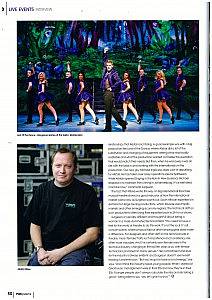
The second part of the Pro-System article.
